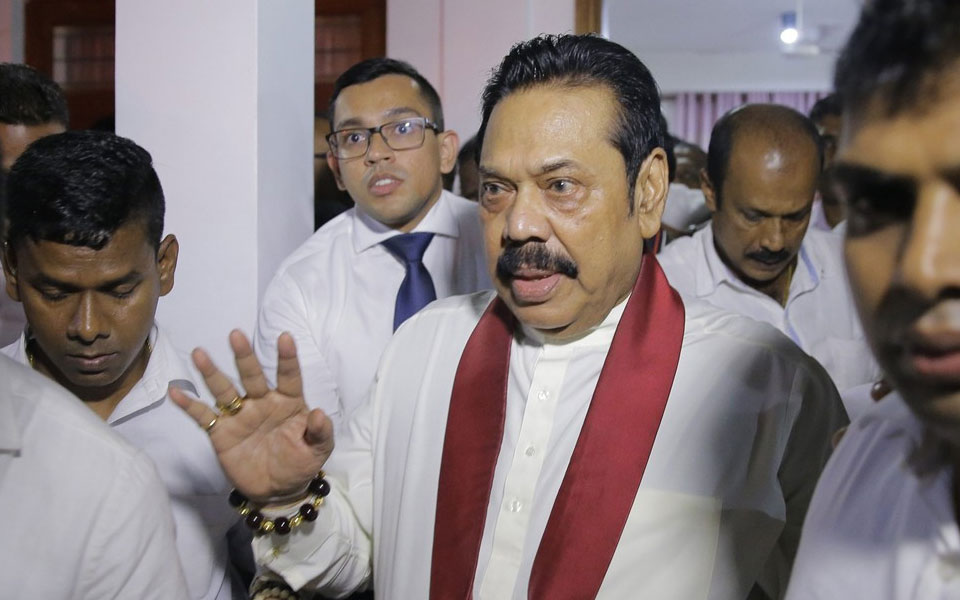Colombo, Oct 27 : Sri Lanka's President Maithripala Sirisena on Saturday issued two extraordinary gazette notices making controversial strongman Mahinda Rajapaksa the new Prime Minister and formally recognising Ranil Wickremesinghe's dramatic dismissal, leading to a constitutional crisis in the island nation.
Hours after sacking his former ally Wickremesinghe, Sirisena issued two gazette notices. First notice is on Wickremesinghe being removed as prime minister and the other on the appointment of Rajapaska as the new permeir, Colombo Gazette reported.
Wickremesinghe, however, has asserted that the swearing in of Rajapaksa in his place is "illegal and unconstitutional" and he will prove his majority in Parliament.
The United National Party (UNP) leader on Friday vowed to carry on as prime minister despite being removed by Sirisena. "I will continue to be the Prime Minister. Mahinda Rajapaksa's appointment is unconstitutional," Wickremesinghe said.
After Rajapaksa took oath at the Presidential Secretariat here Friday, Sirisena wrote to Wickremesinghe, saying he had been removed.
"I had appointed you as the prime minister under (article) 42 (1) of the Constitution and as your appointing authority, I write to notice that you have been removed from the post of prime minister," Sirisena said in the letter.
The sudden development came amid growing tensions between Sirisena and Wickremesinghe on several policy matters and the president has been critical of the prime Minister and his policies, especially on economy and security.
Reacting sharply to his sacking, Wickremesinghe on Friday said that he will continue to be the prime minister till he enjoys the majority in Parliament.
"Only I have the majority. The only way that can be changed is through a no confidence motion or if I resign," Wickremesinghe said referring to the 19th amendment to the Constitution.
Parliamentary Speaker Karu Jayasuriya has said he will decide Saturday whether to recognise Rajapakse or not, after seeking legal advice.
In April, Wickremesinghe successfully defeated a no trust motion in Parliament engineered by Sirisena with backing from Rajapaksa.
The UNP, however, suffered one defection after Rajapaksa was sworn in with Ananda Aluthgamage meeting the former president and extending him support.
The political developments unfolded after Sirisena's broader political front United People's Freedom Alliance (UPFA) announced that it has decided to quit the current unity government with Wickremesinghe's UNP.
The unity government was formed in 2015 when Sirisena was elected President with Wickremesinghe's support, ending a nearly decade-long rule by Rajapaksa.
Rajapaksa's return to power ends a more than three-year-old coalition government that was formed by Sirisena and Wickremesinghe on a promise to combat corruption and financial irregularities.
Sirisena, who was Rajapaksa's minister of health, broke away from him to contest the presidential elections.
Political analysts said Sirisena's move to install Rajapaksa as the prime minister could lead to a constitutional crisis as the 19th amendment to the Constitution would not allow the sacking of Wickremesinghe as the premier without a majority.
Rajapaksa and Sirisena combine has only 95 seats and is short of a simple majority. Wickremesinghe's UNP has 106 seats on its own with just seven short of the majority.
The unity government was thrown into a crisis after Rajapaksa's new party pulled off a stunning victory in local elections in February seen as a referendum on the ruling alliance.
Last week, it was reported that Sirisena accused his senior coalition partner the UNP of not taking seriously an alleged conspiracy to assassinate him and Gotabhaya Rajapaksa, the former top defence ministry bureaucrat and brother of ex-president Mahinda Rajapaksa.
Sri Lanka nearly faced economic sanctions from the West over Rajapakse's brutal military crackdown on the banned Liberation Tigers of Tamil Eelam (LTTE).
The LTTE sought a separate Tamil homeland in the northern and eastern provinces of the island nation for nearly 30 years before its collapse in 2009 after the Sri Lankan Army killed its supreme leader Velupillai Prabhakaran.
Rajapaksa and his family were facing several cases of corruption and financial irregularities.
Let the Truth be known. If you read VB and like VB, please be a VB Supporter and Help us deliver the Truth to one and all.
Hyderabad (PTI): Telangana Chief Minister A Revanth Reddy met Union Home Minister Amit Shah in Delhi on Wednesday night and urged him to increase the sanctioned strength of IPS officers to the state in view of its growing administrative and security needs.
The two leaders also discussed the recent surrender of several senior Maoist leaders before the Telangana Police and other issues.
"During the meeting, the two leaders discussed the issue of Maoist surrenders and their rehabilitation. The chief minister informed Shah that significant improvements in policing have taken place in Telangana over the past two years," an official release here said.
Highlighting that 591 Maoists have laid down their arms and joined the mainstream of society during this period, the chief minister said the state government was providing them compensation and rehabilitation assistance as per the rules.
He requested the Union home minister to extend financial support from the central government for development works in the backward regions of the state.
Reddy also urged Shah to increase the sanctioned strength of IPS officers to the state from 83 to 105 in line with the state's growing administrative and security needs, the statement said.
The first cadre review after the formation of Telangana was conducted in 2016, while the next review, due in 2021, was delayed and finally carried out in 2025. Even then, only seven additional IPS officers were allocated to the state, the chief minister informed Shah and requested that the third cadre review be conducted in 2026 as per the schedule.
Reddy explained that Telangana, like the rest of the country, is facing several modern challenges, including cybercrime, drug trafficking, white-collar crimes, and other emerging security threats.
He highlighted the reorganisation of the Hyderabad, Cyberabad, and Malkajgiri Police Commissionerates, the proposed formation of the Future City Commissionerate and the rapidly growing population in Hyderabad to underline the increasing administrative requirements of the state.





